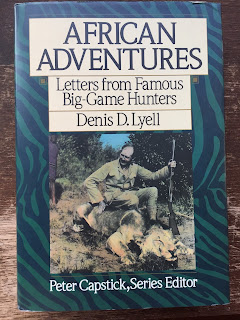The "Corresponding" Hunter
Continuing my quest to read all volumes of the Peter Hathaway Capstick's "Library of African Big Game Hunting and Adventure" (I currently have seven of the fourteen volumes) I just finished reading "AFRICAN ADVENTURES - Letters from Famous Big-Game Hunters", originally published in 1935 by Denis D. Lyell (1871 - 1946).
The limited information that I was able to find shows that Denis David Lyell was born in Calcutta, India, and that his family was originally from Dundee, Scotland. In 1893 he moved first to Ceylon and then elsewhere in India where he established himself as a tea planter. In 1899 he moved again to South Africa and then in 1913 he went to Nyasaland, currently Malawi, a landlocked country bordered by Zambia, Tanzania and Mozambique, and by all accounts some of the greatest big-game hunting grounds in Africa.
After World War I Lyell moved again, back to his family homeland of Scotland. From the time he came to Africa until his death he became immersed in the hunting world and became a renowned author, writing eight books between 1909 and 1935.
In his last book Mr. Lyell presents extracts from his vast correspondence with other famous British big-game hunters, such as Selous, Karamojo Bell, Stigand, Millais, J.A. Hunter, Sir Alfred Pease, Abel Chapman and others, and from this collection of private documents many unique insights from their more mundane aspects of their lives like how it is almost impossible to make a living from writing hunting books (believe me, I know this very well), to discussions on financing hunting trips, extensive discussion on the merit of the small-bore repeating bolt-action rifle versus the large-bore express guns, quality of ammunition and the amount of field failures, common in English made ammo, but unheard of in German made DWM (Deutsche Waffen und Munitionsfabriken), and going on and on and on.
These three paragraphs in a letter from Leslie J. Tarlton dated March 11, 1926 pretty much summarizes all discussions in hunting calibers since the advent of smokeless powder was adopted for small arms ammunition in the French 1886 Lebel 8mm rifle:
"On the much vexed question of small bores, do you not think it so greatly depends upon the skill and knowledge of anatomy possessed by the individual user as to what constitutes the best rifle?
"Karamoja Bell, I believe, swears by the .256. Personally I use a .275 high velocity, but I also think a great deal of the American Springfield, which with a 220 grain bullet is, I rather fancy, the best all round small bore in the world.
"I think the tendency to go in for 'Magnums' is being overdone, because they sacrifice smashing power for velocity and low trajectory. I have killed one or two lions with my little .275, with shots I did not expect to do harm, but at the same time it seems to me that with these very light pointed bullets one is always a trifle uncertain just what they are going to do in heavy muscles of the larger mammals. Take for example the brain shot at an elephant. I think if you got hold of Bell he would probably tell you that the reason he is so keen on the .256 Mannlicher is that the solid bullet, in addition of being very long and slender, is round tipped instead of the sharp Spitzer tip."
And in a letter from J.A. Hunter dated March 23, 1928, the final verdict is pronounced on the 30-06, despite the apparent British contempt for the so-called Colonials:
"Have used practically every make and calibre of rifles, and have good faith in the .256, .275, .280 Ross (in a Mauser action), .318 and .300 Springfield cartridge. The latter I was loath to try, being American, but the genuine Mauser with 24 in. barrel taking the .300 cartridge and 180 grain bullet is a most perfect small bore weapon with great stopping power."
And who can argue that the 30-06 is the best all around hunting cartridge in the world?
In other chapters there is extensive discussion on hunting ethics, where Theodore Roosevelt behavior while in the "African Game Trails", both regarding the amount and quality of shooting is severely criticized, and game conservation, where the USA is applauded: "That is a country where people have awakened to the value of the big game, and where they are now taking wise steps to the protect it."
Well, this is getting too long, so I will stop before I quote all the book, and deprive you the pleasure of reading the book yourself.

